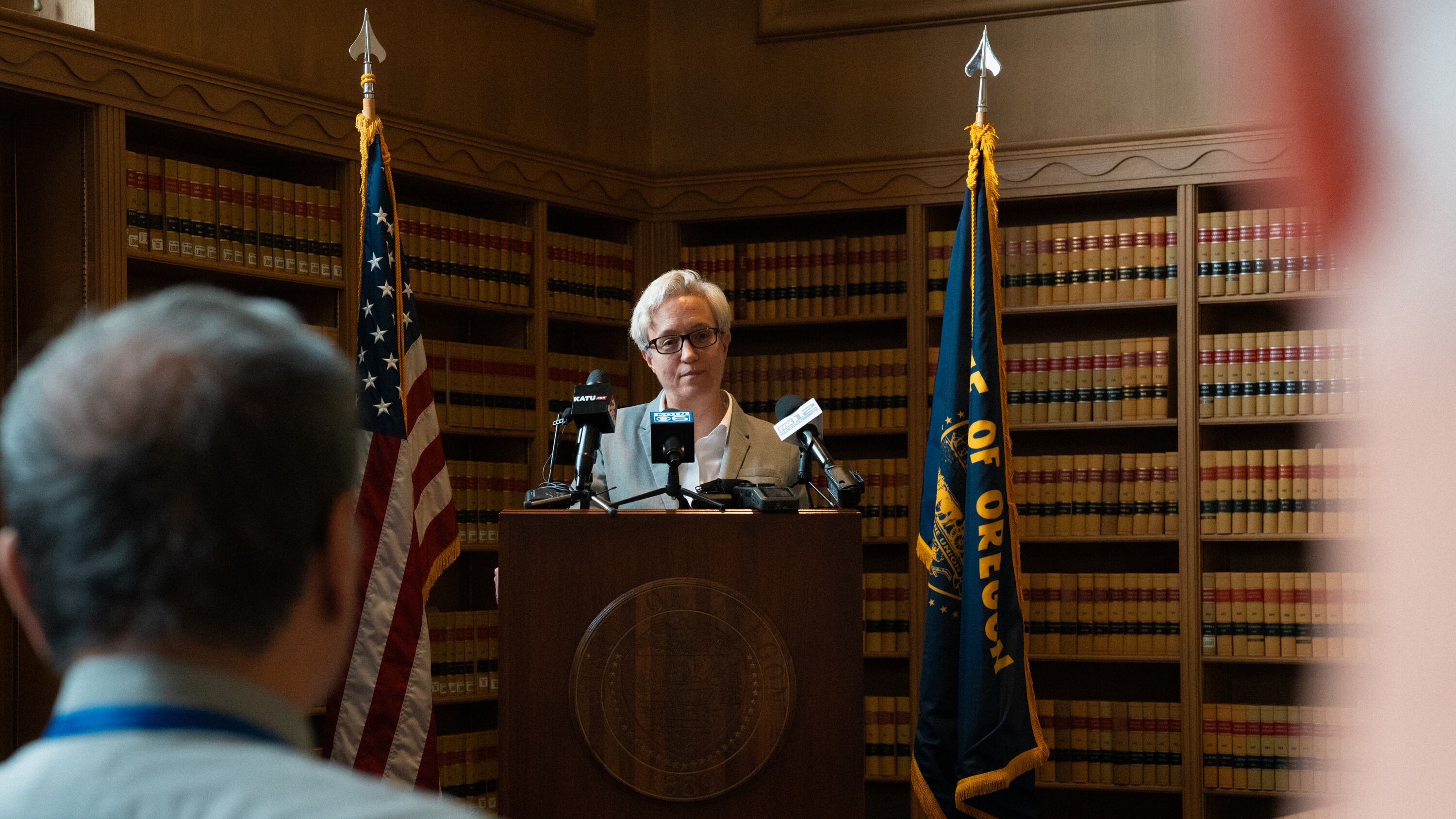Gov. Tina Kotek met with the press today for the second time since high-level departures from her staff began March 22.
In a statement she issued prior to taking questions from reporters, Kotek took a different stance from her previous position that the conflict between her and her staff over the first lady’s story was a non-issue.
That conflict, as emails Kotek’s office released last week show, was substantive and played out over many months, culminating in the departure of chief of staff Andrea Cooper, special adviser Abby Tibbs and deputy chief of staff Lindsey O’Brien. The three senior staffers, emails show, expressed repeated concerns that first lady Aimee Kotek Wilson’s role in the governor’s office was extensive, undefined and, at times, counterproductive.
In response to questions, Kotek told reporters in a 45-minute press conference at the Oregon State Library in Salem that regardless of the legal or ethical advice she may receive in the future, “As long as I am governor, there will not be an office of the first lady.”
That reflected a prepared statement she issued at 3 pm, in which Kotek said she was halting plans to establish an Office of the First Spouse.
“There is no road map in Oregon for defining the role of a first spouse, who is a ‘public official’ under Oregon law,” Kotek said. “There will not be an Office of the First Spouse. There will not be a position of Chief of Staff to the First Spouse. Other than staff that is assigned to support the First Lady in her official duties, no state staff will report to her or be supervised by her.”
What remains unclear is whether the first lady will continue to attend staff meetings on behavioral health and other issues and what level of communication she will have with Kotek’s policy staff or with state agencies. Kotek Wilson’s calendar, for instance, shows that in the past she has had a standing weekly call with Juliana Wallace, Kotek’s behavioral health adviser, and has met with agency officials, consultants to the Oregon Health Authority, and Dr. Robin Henderson, CEO of behavioral health for Providence Health & Services, Oregon.
At the press conference, Kotek declined to say whether the first lady would attend staff meetings or communicate with the governor’s staff or staff agency officials about policy matters, as records show she has done in the past. “I’m going to tell you what she will do,” Kotek said. Those doings: official visits and “listening to Oregonians.”
But Kotek deflected questions about whether the first lady would meet with policymakers as she has done in the past.
“The first lady has professional and lived experience that is valuable,” Kotek said.
Kotek denied that she has prioritized her wife’s interests over those of her staff or the Oregonians they serve and insisted the state has not suffered from the controversy over the first lady’s role and the staff departures it caused.
“I haven’t taken my eye off the ball,” Kotek says. “I don’t sleep a lot and I work hard. And people in our office have stepped up.”
The governor insisted she is waiting for guidance from the Oregon Government Ethics Commission before taking next steps on the first lady’s role. That advice will come after the commission resolves complaints Oregonians have filed about the first lady. Kotek’s staff lawyer, Richard Lane, has provided legal advice on the role of the first lady, but Kotek previoulsy rejected WW’s written request to make those records public and verbally rejected a second request today. “As a matter of policy, my office will not release legal opinions,” she said.
Kotek addressed one of the most remarkable revelations in the emails her office released last week—that she asked her behavioral health adviser, Juliana Wallace, to call a supervisor at Cascadia Behavioral Health, a large Portland nonprofit that formerly employed the first lady, to register a concern that a friend of the first lady raised.
Although Tibbs in a February email to Wallace called the governor’s intervention “highly inappropriate at best,” Kotek defended her actions today, saying the communication was a “matter of workplace safety,” and that she would intervene anytime safety is an issue.
Today’s statement and press conference marked Kotek’s first real acknowledgement that the roll-out of the first lady’s position had been handled poorly, although the governor stuck to the premise that the five staff departures reflected a normal transition. She attributed her willingness to change her stance to emails her office has received from Oregonians, media reports, and even comments on those reports. “I read a lot,” Kotek said.
Summarizing the way events have unfolded around the first lady’s role, Kotek said, “It’s been a little uncertain and messy.”
This story was updated at 4:35 pm, at the conclusion of the press conference.

